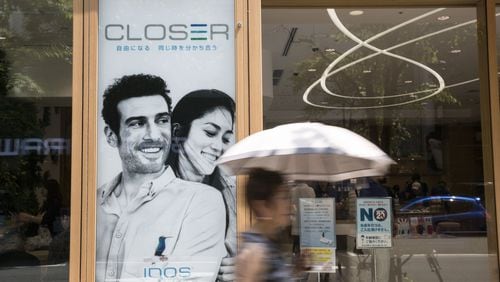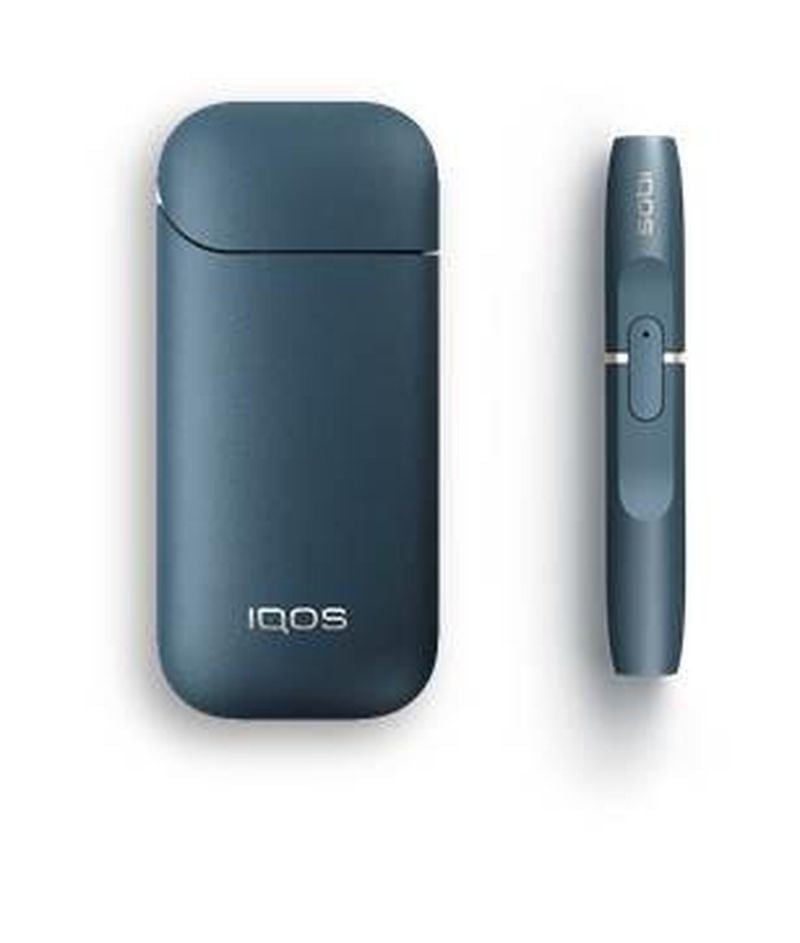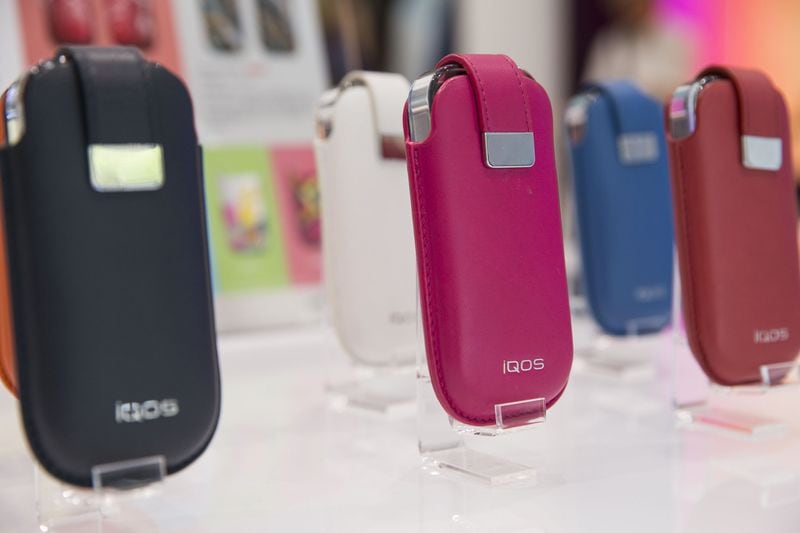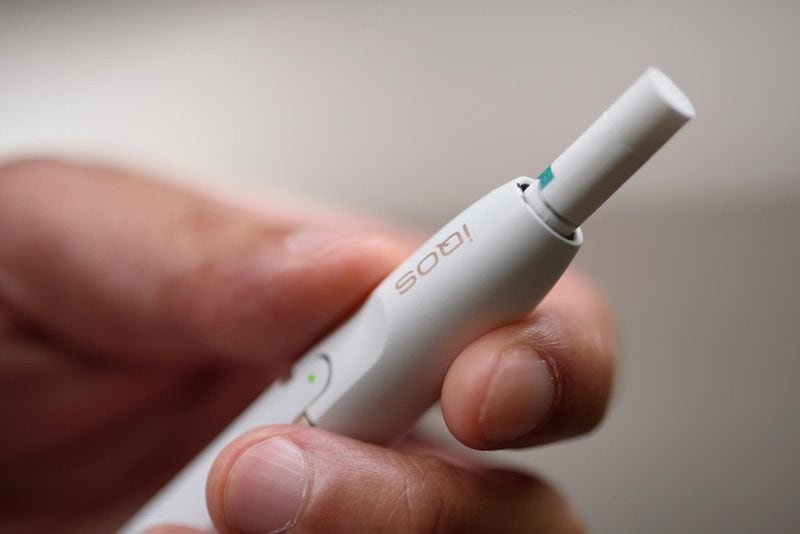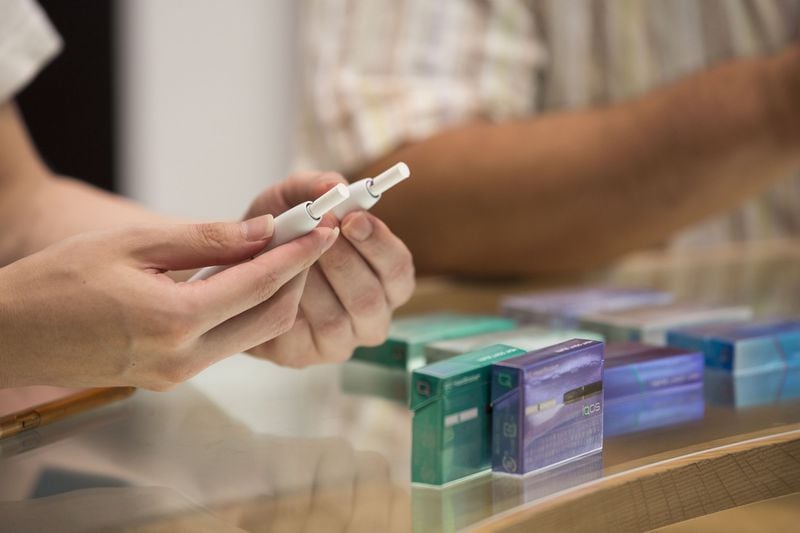The nation’s dominant tobacco company, maker of the top-selling Marlboro cigarette, is trying to become the next e-cigarette giant.
And Atlanta is ground zero in the high-stakes experiment.
Altria has recently started selling a new tobacco product called IQOS, a pen-like electronic device with a sleek battery pack. It hopes to make a splash with an IQOS store at Lenox Square in Buckhead, the company’s first ahead of a national rollout.
The seller of roughly one in every two traditional cigarettes in the U.S. is making the major push as fewer Americans light up and more experiment with vaping devices like e-cigarettes to get their nicotine fix.
Such gadgets, including Altria’s “heat not burn device,” are less harmful than traditional cigarettes which release toxins through combustion. Smoking remains the leading cause of preventable disease and death in the country, killing 480,000 a year.
But there’s plenty of debate swirling around e-cigarettes that create vapor but no combustion. It’s still unclear how much the alternative devices help smokers quit traditional cigarettes. At the same time, vaping gadgets are hooking a new generation of young people on nicotine.
Less harmful also doesn't mean harmless. The Centers for Disease Control and Prevention said on the weekend it is investigating more than 90 potential cases of severe lung illness associated with vaping in 14 states. Symptoms include coughing, difficulty breathing and fatigue.
“I find it ironic that Atlanta is the site of the launch of IQOS,” said Dr. Michael Eriksen, dean of Georgia State University’s School of Public Health. “Atlanta is home of the CDC, home of the American Cancer Society.”
IQOS differs from e-cigarettes already on the market because it contains tobacco rather than liquid nicotine or nicotine salt. The product includes a heating blade that warms a tobacco stick and releases a vapor with the taste of tobacco.
Altria is marketing IQOS in the U.S. in a partnership deal with tobacco giant Philip Morris International, which owns the rights to Marlboro overseas. Philip Morris International invested $6 billion in developing IQOS and has introduced it in more than 45 markets around the world.
The U.S. foray follows earlier failed bids by Altria to capture the e-cigarette market after its MarkTen and Green Smoke brands fizzled. Last year the company shelled out $12.8 billion for a 35% stake in Juul, the dominant e-cigarette brand.
Altria spokesman David Sutton said IQOS will target adult smokers who want to continue using tobacco, not kids or non-smokers. Customers entering the Lenox Square store must be at least 21 years of age, with employees checking IDs. Since IQOS has real tobacco, Altria believes the product will be closer to a classic cigarette experience.
Many anti-tobacco groups are concerned. Denny Henigan, vice president of legal and regulatory affairs at Campaign for Tobacco-Free Kids, notes big tobacco companies hid evidence for years that cigarettes caused cancer. He argued they also have a long history of marketing tobacco to children, including using cartoon characters.
Now Altria is opening “a new slick store in a high-end mall,” said Henigan. “Kids obviously go to the mall and obviously will be interested in this store.”
Altria said the store will help walk potential customers through the steps of using and cleaning the battery-operated, tube-like device but declined to share more details about the store. Other IQOS stores around the globe are sleek and modern, and mimic an Apple store with pendant lighting, sitting areas even a coffee shop. There are currently no stores or kiosks at Lenox Square selling e-cigarettes, but Take 5 News Stand sells traditional cigarettes.
Atlanta was chosen for the U.S. product launch because the large metro area is home to hundreds of thousands of adult smokers and the city has a “tech-forward” attitude, said Sutton, the company spokesman.
The Food and Drug Administration approved IQOS for sale in the U.S. in late April, saying the heated tobacco sticks “produce fewer or lower levels of some toxins than combustible cigarettes” and could help people quit smoking. The agency said it has not decided on a separate request that would allow IQOS to be marketed with reduced risk claims.
The FDA said it won’t allow the company to target ads to teenagers and will track how young people use the product. Because the new product meets the technical definition of a cigarette, it can’t be advertised on TV or radio.
MORE: CBD is everywhere but is it safe?
Solution or new headache?
E-cigarettes and other nicotine delivery systems have grown by leaps and bounds over the past decade in the U.S. and abroad.
Philip Morris International, which doesn’t sell products in the U.S., says 7.3 million people have abandoned cigarettes in other parts of the world in the two years, switching to IQOS. The company’s cigarette volumes fell 3.6% in the second quarter of 2019.
Cigarette use in the U.S. has fallen to record lows among adults and teens, even though Americans haven’t exactly kicked the deadly habit. Some 34.3 million adults still smoke in the U.S., or 14% of the adult population. In Georgia, 17.5% of adults still smoke.
A surge in vaping among U.S. teens, though, has health authorities concerned. Use of e-cigarettes by high-school students soared from 1.5% in 2011 to 20.8% in 2018, according to the CDC. Among 12th graders, 37% reported vaping in 2018, according to the National Institutes of Health.
Sales of Juul have ballooned, with the brand controlling more than 70% of the U.S. e-cigarette market, according to market researcher Nielsen. Juul has faced sharp criticism and growing scrutiny of its device, which looks like a USB flash drive and can fit in the palm of the hand.
Even though Juul vowed not to market to underage users, several studies show many adolescents being exposed to the device through social media. Under pressure by the FDA and others, the company has stopped selling most of its flavored pods like mango in stores and is shutting down its social media presence.
Altria says it won’t sell flavors beyond tobacco and menthol – the only ones allowed for cigarettes under FDA regulations.
GSU’s Eriksen, a tobacco control expert, agrees that heat-not-burn tobacco products are safer than traditional cigarettes.
He’s still concerned, though.
“We have a public health disaster on our hands primarily because of Juul, which has proven to be so appealing to young people and so addictive. I think it’s absolutely incumbent to not let IQOS become the next Juul,” Eriksen said.
Quitting cigarettes by turning to nicotine alternatives also doesn’t appear that simple. Some studies suggest smokers who use e-cigarettes are no more likely to quit than those who don’t. Many continue to use both, smoking when and where they can and turning to vaping when they can’t.
At the end of a one-year study in 2018 tracking people using both e-cigarettes and conventional cigarettes, GSU researchers found 90% percent of them were still smoking. Half were using cigarettes and e-cigarettes, or so-called dual users. Another 40% quit vaping and kept smoking. Only 10% quit both.
Eriksen said Altria wants to hold onto their customer base and continue to sell them nicotine. But he said it’s also too early to rule out that IQOS can wean more smokers from cigarettes.
“It’s all about money and customers, and not particularly noble,” he said. “But if we can get people to not smoke, if we can get them to use a less harmful product, that’s not the worst thing in the world. Because the alternative is so harmful.”
MORE: Atlanta weighs crackdown on e-cigarettes as part of smoking ban
